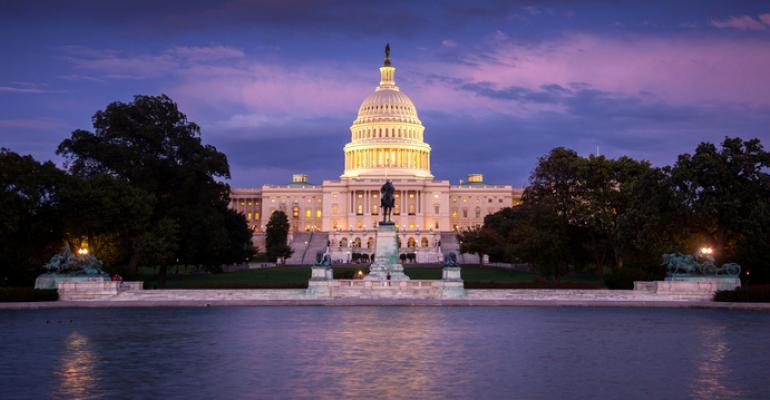The Exhibitions & Conferences Alliance, an advocacy group for the face-to-face business events industry, was launched during the Covid pandemic to advocate for policies that could speed the industry’s economic recovery. While those issues are receding, the group’s vice president, Tommy Goodwin, continues to look ahead.
On a November 12 webinar, Goodwin (below, right) discussed some of the top issues ECA will be watching as the second Trump Administration takes office, including taxes, workforce development, visas, and trade policy.
Taxes
“A lot of the tax policies that were passed in the 2017 Tax Cuts and Jobs Act will be expiring by the end of 2025, and that creates what we here in Washington, D.C., call a ‘tax cliff,’” said Goodwin. 
While the new administration is likely to favor maintaining tax rates for businesses at the 21-percent rate established in 2021, a hike is possible, and any tax increase would put financial pressure on the many small businesses that operate in the meetings and convention industry, Goodwin said.
In addition, tax increases tend to result in corporate budget cuts, “and two of the most common [cuts] are [to] travel and entertainment and marketing and advertising, and those obviously impact the industry greatly,” Goodwin said. Not only do they affect companies’ decisions to exhibit at shows and the number of attendees to send to events, Goodwin notes that when show sizes decrease, there’s a ripple effect: less demand for venue staff, booth builders, and other local suppliers.
In terms of new tax policy, Goodwin will also be watching for any changes in UBIT exemptions for nonprofit associations: “There's an exemption under what's called the unrelated business income tax that allows for membership, education, trade shows, and other things that help associations advance their mission to be considered tax-free revenue. We obviously wouldn't want to see that change.”
Workforce Development
Many event-industry associations offer certifications and other opportunities to help early-career professionals advance in the industry, and ECA is pushing for legislation that would make it easier for people to pay for that education. “We think that’s critically important to our ability as an industry to attract and train our next-generation workforce,” said Goodwin.
Two bills working their way through Congress have ECA’s support. The Freedom to Invest in Tomorrow's Workforce Act (S. 722, H.R. 1477) would expand how tax-advantaged 529 savings can be used, allowing funds to cover the cost of career education like licenses and certifications.
The JOBS Act (S. 161, H.R. 793) would change the rules for Pell Grants—federal financial aid that helps low-income undergraduate students pay for college. Currently, the grants can only be used for programs that are 600 clock-hours or longer; the bill would expand that to programs that are between 150 and 599 clock-hours and at least eight weeks in length. “We want to see the Pell Grant program expanded to include high-quality skills education and training,” said Goodwin, pointing to the forklift drivers, rigging experts, carpenters, electrical workers, and others that the industry relies on. “We have shortages of those workers going back to the pandemic.”
Goodwin noted that more than a quarter of the Senate is endorsing the Jobs Act. “We're going to be pushing very aggressively to get this one over the finish line.”
Visas
Another issue on ECA’s radar for 2025 isn’t new: visa backlogs. Going back to late 2021 when travel began to resume after the worst of the pandemic, the wait times for visas to enter the U.S. from non-visa-waiver countries have been extreme. It’s improving, said Goodwin, but there’s more work to do.
“Earlier this year, ECA was successful in getting the State Department $50 million of discretionary funding to deal with visa backlogs, and we've already seen a tremendous impact,” Goodwin said. “Over the last six months, visa wait times in Mexico are down 60 percent. We've also seen wait times really bottom out in places like Brazil and China, which are two big inbound markets for the United States. But some markets are still very much of concern, including India, quite a bit of Southeast Asia, the Middle East, and Latin America.”
In those regions, he said, it can still take hundreds of days to get an interview for a visitor visa that would allow an exhibitor or attendee to come to a show in the U.S. “As a result, those markets have really been off limits to us as an industry,” Goodwin said.
“So, a lot of progress has been made, but we will be keeping an eye to make sure that we continue that progress and don't see any backsliding.”
Trade Policy
ECA will also be closely following the Trump Administration’s trade policy. “If you watched anything during the lead-up to the election, you know that the President-Elect has been very outspoken around his interest in resetting the international trade environment, using both tariffs and non-tariff barriers to ensure that more goods are produced here in the United States,” Goodwin said. “But that also has the detrimental impact of making goods that come in from abroad much more costly.”
With many event-industry materials sourced internationally—for example, promotional materials, high-quality printed materials, audiovisual equipment, and modular display systems—Goodwin sees the cost increases as a potential challenge in the years ahead. However, the issue “isn’t necessarily on ECA’s agenda,” he said, because trade policy isn’t something that gets debated on Capitol Hill.
The President “has a lot of that authority already vested in him, and so it comes down him and his United States trade representative and some of the various other Cabinet Secretaries to determine whether new tariffs will be brought on board.”





